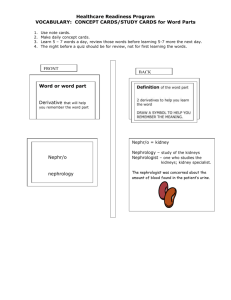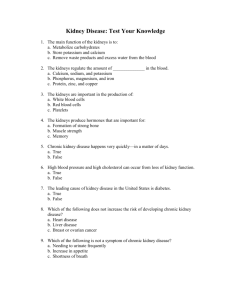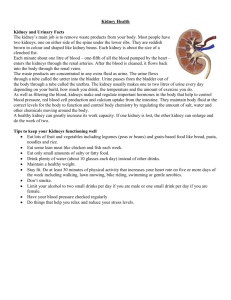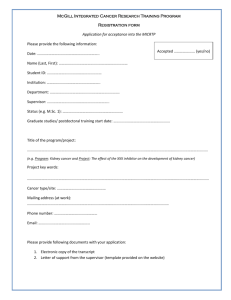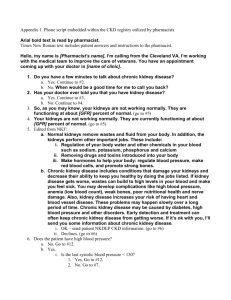Chronic Kidney Disease Information for WellCare Members
advertisement
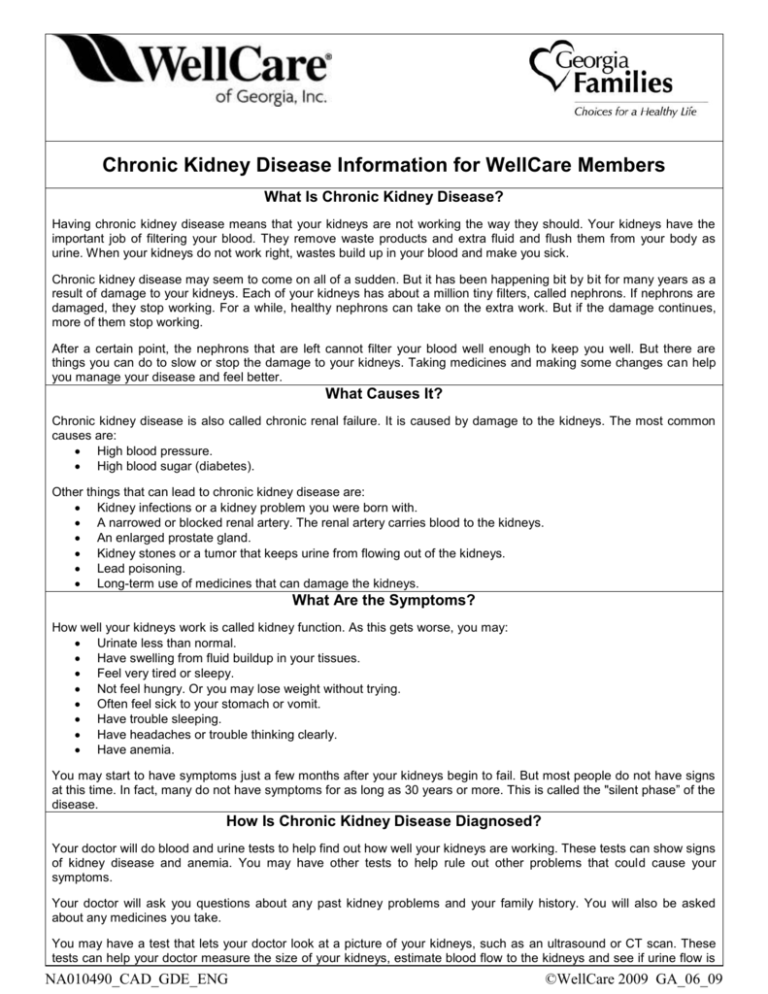
Chronic Kidney Disease Information for WellCare Members What Is Chronic Kidney Disease? Having chronic kidney disease means that your kidneys are not working the way they should. Your kidneys have the important job of filtering your blood. They remove waste products and extra fluid and flush them from your body as urine. When your kidneys do not work right, wastes build up in your blood and make you sick. Chronic kidney disease may seem to come on all of a sudden. But it has been happening bit by bit for many years as a result of damage to your kidneys. Each of your kidneys has about a million tiny filters, called nephrons. If nephrons are damaged, they stop working. For a while, healthy nephrons can take on the extra work. But if the damage continues, more of them stop working. After a certain point, the nephrons that are left cannot filter your blood well enough to keep you well. But there are things you can do to slow or stop the damage to your kidneys. Taking medicines and making some changes can help you manage your disease and feel better. What Causes It? Chronic kidney disease is also called chronic renal failure. It is caused by damage to the kidneys. The most common causes are: High blood pressure. High blood sugar (diabetes). Other things that can lead to chronic kidney disease are: Kidney infections or a kidney problem you were born with. A narrowed or blocked renal artery. The renal artery carries blood to the kidneys. An enlarged prostate gland. Kidney stones or a tumor that keeps urine from flowing out of the kidneys. Lead poisoning. Long-term use of medicines that can damage the kidneys. What Are the Symptoms? How well your kidneys work is called kidney function. As this gets worse, you may: Urinate less than normal. Have swelling from fluid buildup in your tissues. Feel very tired or sleepy. Not feel hungry. Or you may lose weight without trying. Often feel sick to your stomach or vomit. Have trouble sleeping. Have headaches or trouble thinking clearly. Have anemia. You may start to have symptoms just a few months after your kidneys begin to fail. But most people do not have signs at this time. In fact, many do not have symptoms for as long as 30 years or more. This is called the "silent phase” of the disease. How Is Chronic Kidney Disease Diagnosed? Your doctor will do blood and urine tests to help find out how well your kidneys are working. These tests can show signs of kidney disease and anemia. You may have other tests to help rule out other problems that could cause your symptoms. Your doctor will ask you questions about any past kidney problems and your family history. You will also be asked about any medicines you take. You may have a test that lets your doctor look at a picture of your kidneys, such as an ultrasound or CT scan. These tests can help your doctor measure the size of your kidneys, estimate blood flow to the kidneys and see if urine flow is NA010490_CAD_GDE_ENG ©WellCare 2009 GA_06_09 blocked. In some cases, your doctor may take a tiny sample of kidney tissue to help find out what is causing your kidney disease. How Is It Treated? Chronic kidney disease is usually caused by something else. So the first step is to treat the disease that is causing kidney damage. Diabetes and high blood pressure cause most cases of chronic kidney disease. If you keep your blood pressure and blood sugar near normal levels, you may be able to slow or stop the damage to your kidneys. Losing weight and getting more exercise can help. You may also need to take medicines. Lifestyle changes are an important part of your treatment. Taking these steps can help slow down kidney disease and reduce your symptoms. They may also help with high blood pressure, diabetes and other problems that make kidney disease worse. Follow a diet that is easy on your kidneys. A dietitian can help you make an eating plan with the right amounts of salt and protein. You may also need to watch how much fluid you drink each day. Get some exercise every day. Work with your doctor to design a program that is right for you. Do not smoke or use tobacco. Do not drink alcohol. Always talk to your doctor before you take any new medicine, including over-the-counter items, prescription drugs, vitamins and herbs. Some of these can hurt your kidneys. To stay as healthy as possible, work closely with your doctor. Go to all your appointments, and take your medicines the way your doctor says to. What Happens If My Kidney Disease Gets Worse? When kidney function is very poor, it is called kidney failure. This affects your whole body. It can cause serious heart, bone and brain problems and make you feel very ill. If you have kidney failure, you will probably have two choices: start dialysis or get a new kidney (transplant). Both of these treatments have risks and benefits. Talk with your doctor to decide which would be best for you. Dialysis is a way to have a machine filter your blood when your kidneys no longer can. It is not a cure, but it can help you feel better and live longer. Kidney transplant may be the best choice if you are otherwise healthy. With a new kidney, you will feel much better and will be able to live a more normal life. But you may have to wait for a kidney that is a good match for you. And you will have to take medicine for the rest of your life to keep your body from rejecting the new kidney. Making treatment decisions when you are very ill is hard. It is normal to be worried. Discuss your concerns with your loved ones and your doctor. It may help to visit a dialysis or transplant center and talk to others who have made these choices. References Healthwise, Incorporated. Chronic Kidney Disease. Author: Jeanette Curtis. Medical Review: E. Gregory Thompson, MD (Internal Medicine), D.C. Mendelssohn, MD, FRCPC (Nephrology). November 13, 2007. Legal Disclaimer: Preventive health guidelines are based on information and recommendations of independent third parties available before printing. These guidelines are not a replacement for your doctor’s medical advice. Your doctor may have more up-to-date information. Members should always talk with their doctor(s) about what care and treatment is right for them. The fact that a service or item is in these guidelines is not a guarantee of coverage or payment. Members should look at their own plan coverage papers to see what is or is not a covered benefit. WellCare does not offer medical advice or provide medical care, and does not guarantee any results or outcomes. WellCare does not warrant or guarantee, and shall not be liable for, any information that is in these guidelines or that is not in these guidelines or for any recommendations made by independent third parties from whom any of the information was obtained. Version: 3/2009 Para solicitar este documento en español o para escuchar la traducción llame al Servicio al Cliente al 1-866231-1821 (TTY/TDD: 1-877-247-6272). NA010490_CAD_GDE_ENG ©WellCare 2009 GA_06_09

